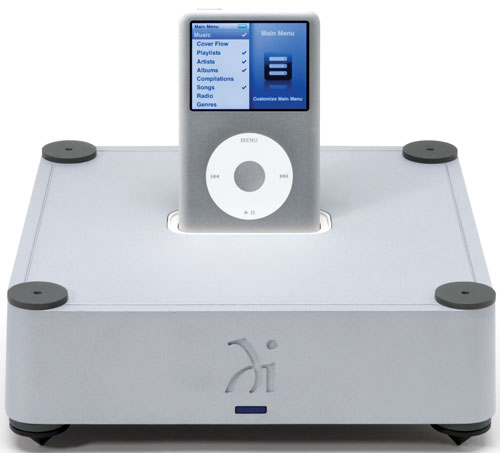
The iTransport accommodates Apple’s iPod Nano G1, G2, G3, iPod Video, iPod Classic and iPod Touch. It comes with a remote that interfaces with the iPod so you can control the PLAY, PAUSE, BACKWARD and FORWARD functions of the iPod. The Wadia even charges the iPod during use. To create music files on the iPod, one first uses the Apple iTunes software on his computer, a laptop in my case, to “import” a CD via the computer’s CD drive onto its hard-drive. Note that before the music files are copied onto the iPod’s hard-drive, they are stored in your computer’s hard-drive as the original data. To set up the iTunes for high-resolution archiving, be sure to select EDIT under the top menu, then PREFERENCE. Then under the GENERAL tab choose “Import Settings”, and choose “WAV Encoder” and designate “Custom” of “48kHz, 16-bit, Stereo”. That’s right, 16bit/48kHz, and at that resolution each minute of music takes up at least 10 MB of disc space, dwarfing the 2 MB resolution per minute of the 256kbps AAC format. The sound is very, very good. For this kind of disc space requirement, before imprinting the same music files onto my iPod, I set up the iTunes to store the music in a portable Toshiba 500 GB hard-drive first, giving the iTunes library plenty of space to grow. Transferring the music files onto the iPod is called “synchronization”, per the Apple jargon. An included USB cable connects the iPod to your computer, and the iTunes performs the task at your bidding.
The advantage of having your music on an iPod is being able to take your entire music library wherever you go. The iPod costs $249 and has a storage capacity of 160 GB. After all the ripping of CDs, many of them classical symphonies, I have only managed to occupy half of the iPod’s 160 GB disk space thus far. And you can drag music files out of the iPod and back into the iTunes hard-drive library, and move the music files back in liberally. Together, the Apple iPod and Wadia 170iTransport cost only $628, and I promise you will have music sounding better than most CD transports can give you, plus tons of fun doing it.
Now, if you have no need for a portable music server, then check out the Lindemann USB-DDC 24/96 digital-to-digital converter. It is a tiny little module that takes the same iTunes music files directly from my Toshiba miniature portable hard-drive via a USB cable and hands over the signal to a standard SP/DIF digital cable, and then onto a DAC. Yes, there are USB-equipped DACs out there now, but the Lindemann enables you to use your own DAC with a coaxial or Toslink digital input. So, this little USB-DDC device uses your computer’s hard-drive as your music source, except in this case you can work on your laptop, surf the internet or type your reviews like I do, all the while having your entire music library at your fingertip without having to get up; it even allows you to stream live radio feeds right from your laptop to your DAC, although it is a shame that the MP3 standard is all the rage in streaming. A very liberating experience. Have your cake and eat it, too!
Since the DAC sits at where the rest of my system is, a 5-meter Aqvox audiophile USB cable transmits the signal from my laptop to the Lindemann, which sits next to my Audio Note DAC5 Special. The Lindemann costs $650, inputs USB and outputs SP/DIF and Toslink optical. Imagine the power at your finger tip. The Lindemann runs on the USB signal and does not require additional power source. All you need is a good coaxial digital cable. Two Dagogoans are conducting independent audition on two top digital cables from established marks that are priced surprisingly sensibly, and I’ve been told that the reviewers are quite impressed. Watch for upcoming reviews from Dagogo.
Both the Apple iPod/Wadia 170iTransport system and the laptop/Lindemann USB-DCC 24/96 system sound markedly detailed and spacious, carrying an uncharacteristic warmth and roundness not easily heard in digital at any price, although also somewhat less defined in spatiality and tonal precision than a $10,000 CD transport I am auditioning. Neither the Apple/Wadia nor laptop/Lindemann could rival a high-end transport like the $30,000 47 Lab PiTracer, but it does make many budget transports obsolete unless ultimate fidelity is the goal. Concessions have to be mentioned here as the iTunes does import CDs at 13 to 18x the normal reading speed, albeit playing back at 16/48. So, in the case of the laptop/Lindemann setup, your computer sound card’s quality is probably sub-par at best in strict audiophile sense. Of course, the better the DAC you have, the more you will appreciate the performance as offered by either the iPod/170 or the Laptop/USB-DDC 24/96 experience. I don’t recommend affordable products very often because not a whole lot of them sound truly high-end; but both the Wadia 170iTransport and the Lindemann USB-DCC 24/96 elevated the standard of affordable high-end significantly, so much so that it is a disservice to Dagogo’s readers if I don’t recommend them.
- (Page 1 of 1)
